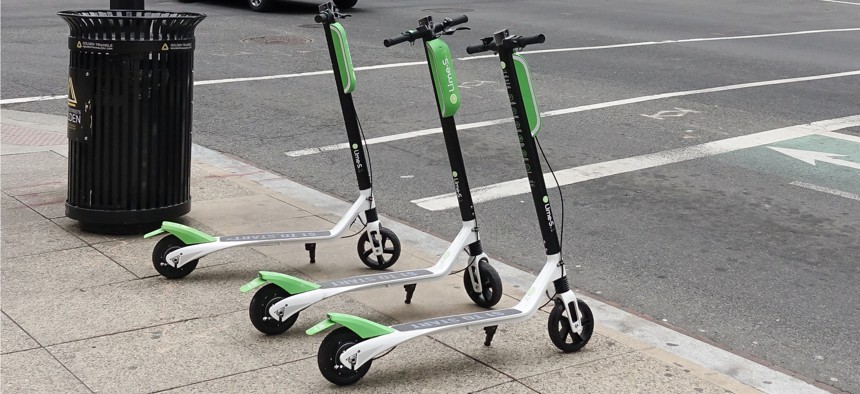Charlotte’s Scooter Share Halted After One Day

A Lime electronic scooter on L Street NW in Washington, D.C. Shutterstock
City officials said Lime didn’t have permission to implement its e-scooter program on local streets.
Electric scooters had a short run in Charlotte. North Carolina’s largest city shut down Lime’s electric scooter service after just one day of operation because city officials said the measure had not been approved there, The Charlotte Observer reported Wednesday.
The company, formerly called LimeBike, had launched the scooter share in the Queen City on Tuesday with lunch-hour demonstrations at a light-rail station. People were still using the scooters as of Wednesday afternoon, according to the Observer.
Lime is one of a handful companies welcomed by the city since November as part of a pilot program to test whether dockless bike-sharing will work there. But the company never received permission to include scooters as part of that program.
It’s the latest snag for companies that have wanted to deploy electric scooter sharing programs, something that has sparked controversies in other cities.
In San Francisco, the scooter proliferation has led to vandalism, people illegally riding on sidewalks and parked scooters obstructing walkways and other public areas. City officials have received complaints from thousands of residents, including some who have been injured by scooters.
To address the problem, San Francisco instituted a new permitting process that will limit the number of scooters to 1,250 for the entire city and require companies to register them with the Municipal Transportation Agency. That policy retroactively addresses a key complaint among city officials: that scooter companies sidestepped government regulations by implementing the technology before the statutes could catch up.
“It would be very nice if the tech bros could come in and ask in a collaborative fashion for permission rather than after-the-fact forgiveness,” San Francisco Supervisor Aaron Peskin said at a meeting in which the city was considering scooter regulations, The Pew Charitable Trusts’ Stateline recently reported.
But the scooters have fared better in Southern cities with hillier geography and hotter weather. In some cases they perform better than traditional bike shares, which many residents eschew for fear of showing up to work or business meetings drenched in sweat.
Advocates of electronic scooters and bike share systems also tout their ability to close last-mile gaps and give users an easy-to-access car-free alternative to complete shorter trips within congested areas.
Charlotte was the third East Coast city to get electric scooters, following Washington, D.C. in March and Miami in April. Lime said it hopes to bring the scooters back to Charlotte.
"We have, and will continue to work collaboratively with the city towards a common-sense regulatory solution that prioritizes rider safety and accessibility, while maintaining our scooters as an affordable, transportation alternative for residents of Charlotte," Lime said in a statement. "We look forward to continuing to serve locals with a convenient way to get around, as we have done for more than 20,000 riders in Charlotte since launching last year."
Kate Elizabeth Queram is a Staff Correspondent for Government Executive’s Route Fifty and is based in Washington, D.C.
NEXT STORY: Gmail update sparks public records concern





